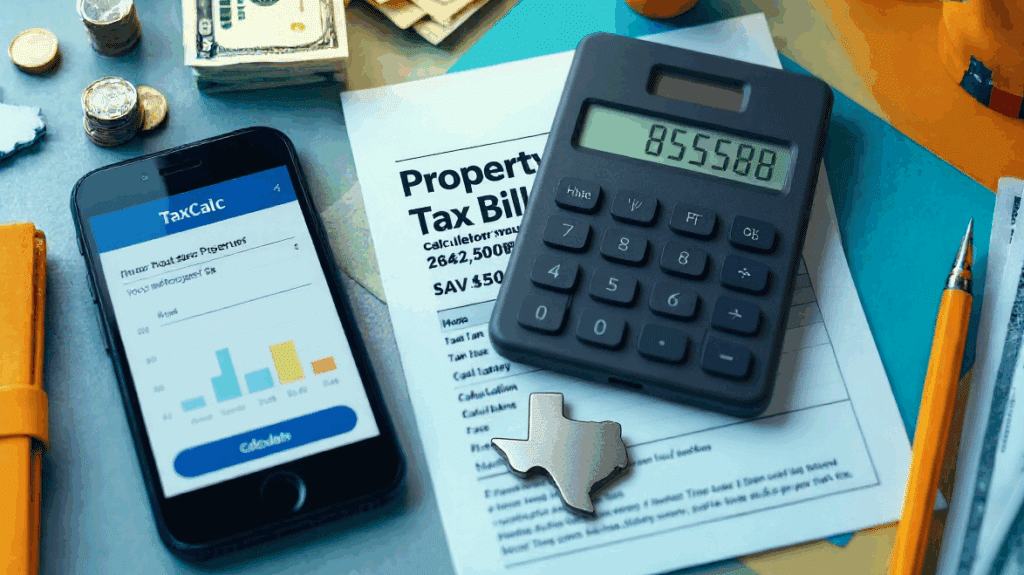Key Takeaways
Understanding Texas property tax terms is essential for navigating exemptions, protests, and regulations, especially with significant 2025 changes.
- Master key definitions like appraisal vs. market value, exemptions, and protest procedures to make informed decisions
- Circuit breaker limitations now cap non-homestead property increases at 20% annually through 2026
- Homestead exemptions increased to $140,000, providing substantial savings for primary residences
- Protest deadlines remain May 15th or 30 days after notice, with specific procedures for challenging assessments
Comprehensive terminology knowledge empowers property owners to minimize taxes and navigate Texas’s complex property tax system effectively.
Texas property tax law changes frequently, and understanding the terminology can mean the difference between overpaying and securing fair assessments. With recent 2025 legislative updates bringing significant property tax relief measures, including increased homestead exemptions and new circuit breaker limitations, property owners need current, accurate definitions of key terms.
Whether you’re a first-time homeowner learning to navigate property tax protests or an experienced investor managing multiple properties, this comprehensive glossary covers all the essential Texas property tax terms you need to understand. From basic appraisal concepts to complex protest procedures, each definition includes practical context and examples that matter for Texas property owners in 2025.
Essential Texas Property Tax Terms Every Texas Homeowner Should Know
Understanding these fundamental terms provides the foundation for navigating Texas’s complex property tax system effectively.
Basic Assessment and Valuation Terms
Accessory Dwelling Unit (ADU)
A secondary housing unit on the same property as a single-family home, including attached units, detached structures, or converted existing spaces. ADUs require specific property codes and may impact appraisal values differently than the main residence. Texas cities like Austin and Dallas have clarified ADU regulations, with specific size and setback requirements affecting property classifications.
Ad Valorem Tax
Latin term meaning “according to value,” referring to taxes based on the assessed value of property. Texas property taxes are ad valorem taxes, calculated by multiplying your property’s taxable value by the applicable tax rates from various local entities.
Appraised Value
The value assigned to your property by the county appraisal district, used as the starting point for calculating property taxes. This differs from market value and may be subject to exemptions and caps. Under Texas law, tax appraised value should reflect 100% of market value as of January 1st each year.
Assessed Value
The final taxable value of your property after applying exemptions and caps to the appraised value. This is the number actually used to calculate your property tax bill. For homestead properties, the assessed value cannot increase more than 10% annually due to the homestead cap.
Central Appraisal District (CAD)
The local government entity responsible for appraising all property within a county and administering exemptions. Each of Texas’s 254 counties has its own CAD, though some smaller counties may contract with neighboring districts. CADs are independent of tax-collecting entities but work closely with them.
Chief Appraiser
The chief administrative officer of a central appraisal district, responsible for overseeing property valuations, exemption approvals, and the overall appraisal process. The chief appraiser also represents the district during informal hearings and formal ARB proceedings.
Exemption and Relief Terms
Circuit Breaker Limitation
A 2025 provision that caps annual increases in appraised value at 20% for non-homestead properties valued at $5.16 million or less. This temporary relief applies to rental properties, commercial buildings, and second homes through 2026, providing protection similar to homestead caps for qualifying properties.
Homestead Exemption
A property tax reduction available to homeowners who use their property as their primary residence beginning January 1st of the tax year. All residence homestead owners are allowed a $140,000 residence homestead exemption from their home’s value for school taxes.
Homestead Cap (or Limitation)
A restriction that limits annual increases in the assessed value of homestead properties to 10% of the previous year’s assessed value, regardless of how much the market value increases. This cap helps protect homeowners from dramatic tax increases during periods of rapidly rising property values.
Over-65 Exemption
Additional property tax relief available to homeowners age 65 and older, providing both exemption amounts and tax ceiling protections. Individuals age 65 or older or disabled resident owners qualify for a $60,000 residence exemption for school taxes, in addition to the $140,000 exemption for all homeowners.

Tax Ceiling (Tax Freeze)
A benefit available to homeowners over 65 or with disabilities that limits school district property taxes to the amount paid in the lesser of their first two qualifying years.
Under Texas Tax Code Section 11.26, if an individual qualifies for the exemption after the beginning of their first year and the residence homestead remains eligible for the same exemption the following year, and if the school district taxes in the next year are less than the first year, the tax ceiling is set at the lower amount from the year immediately following the first qualifying year. The ceiling can transfer between qualifying properties and only increases if substantial improvements (not repairs) are made to the home.
Protest Process and Legal Terms
Appraisal Review Board (ARB)
An independent panel of local citizens authorized to hear and decide property tax protests. ARB members are appointed by either the county judge or appraisal district board, depending on county size. Recent reforms allow voters in some counties to elect ARB members as part of enhanced taxpayer protections.
Burden of Proof
The legal requirement determining which party must prove their case during a protest hearing. Generally, the appraisal district has the burden to prove the accuracy of their valuation, though this can shift to the property owner under certain circumstances.
Formal Hearing
An official ARB proceeding where property owners present evidence challenging their property’s appraised value. These hearings follow specific procedures, allow testimony under oath, and result in binding decisions that can be appealed to district court or binding arbitration.
Informal Hearing
A preliminary meeting between property owners and appraisal district staff to discuss valuation concerns before formal ARB proceedings. Most appraisal districts resolve the majority of disputes during the informal process, making this an important first step in protests.
Notice of Appraised Value
The official document sent by appraisal districts notifying property owners of their property’s current year valuation. This notice must be mailed by April 1st for homestead properties and includes instructions for filing protests and information about exemptions.
Protest Deadline
The final date for filing property tax protests, typically May 15th or 30 days after receiving the Notice of Appraised Value, whichever is later. Missing this deadline prevents property owners from challenging their current year valuation.
Market Analysis and Valuation Terms
Comparable Properties (Comps)
Properties similar to yours in location, class, size, age, and condition, used to support valuation arguments during protests. Effective comparable analysis requires careful adjustments for differences between properties and should focus on sales from the previous year or current assessments with proper modifications for unique characteristics.
Effective Tax Rate
The actual percentage of property value paid in taxes, calculated by dividing total taxes owed by the property’s market value. This differs from stated tax rates because it accounts for exemptions and assessment practices that may vary between properties.
Market Value
The amount of money which could be obtained for property exposed to the market for a reasonable period of time, where both parties are knowledgeable regarding all possible uses and defects with the property and neither party is under duress to consummate a transaction. This represents what your property would sell for under normal market conditions.
Mass Appraisal
The systematic process used by appraisal districts to value large numbers of properties using statistical models, computer algorithms, and standardized approaches. While efficient for handling thousands of properties, mass appraisal can sometimes miss unique characteristics of individual properties.
Unequal Appraisal
A valid protest ground occurring when your property is valued higher than comparable properties without justification. This requires demonstrating that similar properties in your area have lower assessed values after making appropriate adjustments for differences.

Key 2025 Updates and Legislative Changes
Recent legislation has introduced several important changes that affect property tax terminology and procedures.
New Relief Measures
Property Tax Relief Act (Senate Bill 2)
Comprehensive legislation providing significant property tax cuts, including increased homestead exemptions, circuit breaker protections for non-homestead properties, and enhanced school funding to offset local revenue losses.
Business Personal Property (BPP) Exemption
Proposed increase from $2,500 to $125,000 in the value of business inventory and equipment exempt from property taxation, pending voter approval. This change would significantly reduce tax burdens for small and medium-sized businesses.
Process Improvements
Taxpayer Liaison Officer (TLO)
Required position in counties with populations over 120,000, responsible for helping property owners understand the appraisal and protest processes. TLOs provide assistance with filing complaints and accessing resources but cannot influence protest outcomes.
Electronic Filing Requirements
Appraisal districts with websites must allow electronic filing of protests for properties with homestead exemptions, streamlining the process for residential property owners while maintaining traditional filing options.
Advanced Terms for Property Tax Professionals
These specialized terms become important for complex properties or professional property management.
Agricultural Valuation
Special appraisal method for qualifying agricultural land, typically resulting in significantly lower taxable values than market-based assessments. Properties must meet specific use and income requirements to qualify and maintain this beneficial treatment.
Rendition
The legal requirement for business owners to report their personal property holdings to the appraisal district annually. Failure to file accurate renditions can result in penalties and higher assessments.
Share-CAD Property
Properties that span county lines and are valued by multiple appraisal districts. Texas law requires accepting the lowest assessment from any involved district, creating opportunities for property owners to benefit from favorable valuations.
Professional Property Tax Protest Company
A licensed firm that represents property owners throughout the entire protest process, from initial valuation analysis through final ARB hearings. Quality protest companies employ experienced professionals who handle all paperwork, evidence gathering, comparable property analysis, and representation at hearings.
While some firms work purely on contingency (only getting paid for reductions achieved), the most comprehensive services use hybrid fee models that include modest upfront fees plus performance-based compensation, ensuring they complete the full protest process regardless of outcome potential—the only way to definitively determine if you’re receiving fair property valuations.
How These Terms Impact Your Property Taxes
Understanding property tax terminology directly affects your ability to minimize taxes and navigate the system effectively. When you receive your Notice of Appraised Value in the spring, these definitions will help you understand whether the assessment is fair and what options you have for challenging the value.,

The relationship between appraised value, assessed value, and your final tax bill involves multiple calculations. For example, a $400,000 home with a $140,000 homestead exemption and a 10% increase cap might have an assessed value quite different from its market value, depending on previous years’ assessments and any improvements made to the property.
Similarly, understanding the difference between informal and formal hearings can help you choose the most effective approach for your protest. Many property owners succeed in reducing their valuations during informal meetings with appraisal district staff, avoiding the need for formal ARB proceedings.
Key Benefits of Understanding Property Tax Terms
- Strategic Planning: Knowing the difference between appraised and assessed values helps you understand how exemptions and caps work together to affect your tax bill.
- Effective Protests: Understanding burden of proof requirements and comparable property analysis improves your chances of successful protests.
- Long-term Savings: Recognizing how annual protests affect future valuations helps you develop strategies for consistent tax management.
- Exemption Maximization: Familiarity with various exemption types ensures you don’t miss opportunities for additional savings.
Frequently Asked Questions
Q: What’s the difference between appraised value and market value?
A: Market value represents what your property would sell for in the current market as of the first of the year, while appraised value is the CAD’s assessment used for tax calculations. These numbers can differ significantly due to timing, methodology, and market conditions.
Q: How do circuit breaker limitations affect my rental property?
A: If your rental property is valued at less than $5.16 million, its appraised value cannot increase more than 20% annually through 2026. This provides protection similar to homestead caps for investment properties.
Q: Can I protest my property taxes if I have a homestead exemption?
A: Yes, exemptions and protests are separate processes. Having a homestead exemption doesn’t prevent you from challenging your appraised value, and successful protests can provide additional savings beyond exemption benefits.
Q: What happens if I miss the protest deadline?
A: Missing the May 15th deadline generally prevents you from protesting for that tax year. However, late protests may be accepted under limited circumstances, such as failure to receive required notices from the appraisal district or medical emergencies.
Q: When should I apply for a homestead exemption?
A: You can apply for a homestead exemption as soon as you purchase and move into your home as your primary residence. There’s no specific deadline, though applying early ensures you receive benefits for the current tax year.
Take Control of Your Property Tax Knowledge
Mastering Texas property tax terms empowers you to make informed decisions about exemptions, protests, and long-term tax planning. With significant legislative changes and potential additional relief measures on future ballots, staying current with these terms and concepts becomes even more valuable.
Whether you’re evaluating your current assessment, preparing for a protest, or simply wanting to understand your tax bill better, this comprehensive glossary provides the foundation you need. Remember that property tax management is an ongoing process—successful property owners review their assessments annually and take action when necessary.
Every time you successfully argue down your property’s market value through the protest process, you’re lowering the base rate that assessors use the following year to calculate new valuations. This compound effect makes annual protesting a powerful long-term strategy, especially when combined with proper exemption applications and understanding of assessment caps.Ready to ensure fair property valuations year after year? Home Tax Shield manages the complete property tax protest process from start to finish, handling everything from initial valuation analysis and evidence preparation to ARB representation, ensuring you maintain fair assessments and maximize long-term savings with professional expertise and no stress. Sign up today to start the process.